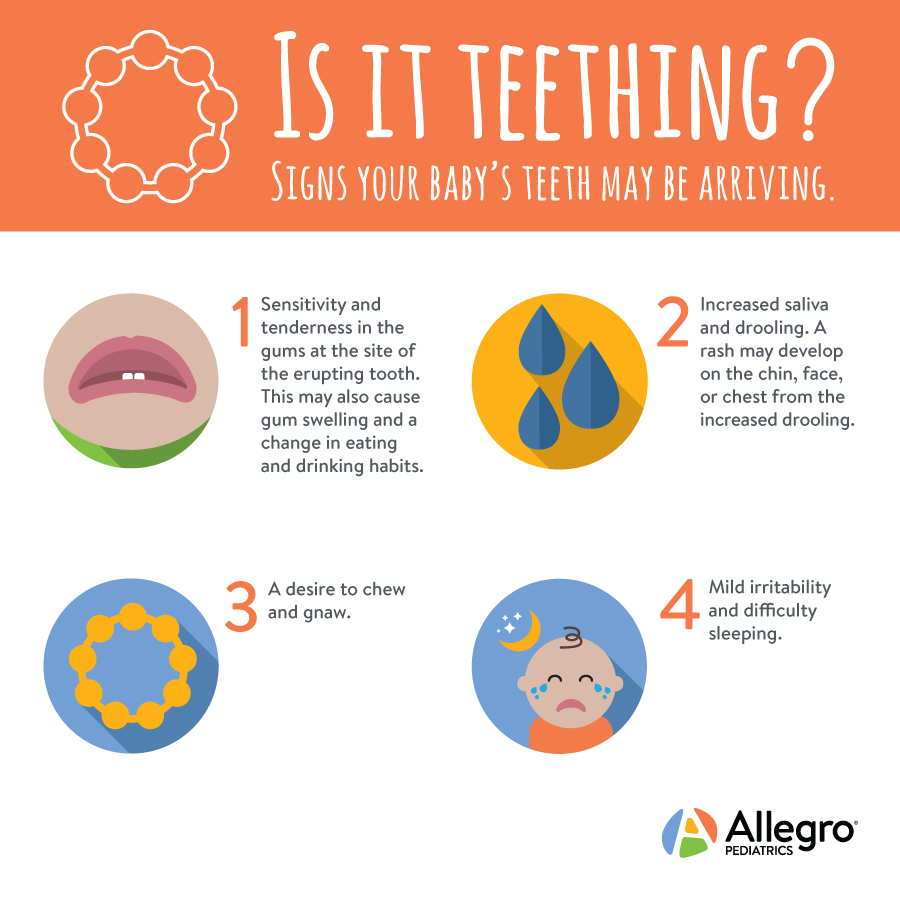
What is teething?
Teething is a process in which the first set of teeth, called primary teeth, erupt and break through the gums.
When does it occur?
The timing for teething varies from child to child, yet generally begins between 3 and 15 months. Most babies get their first tooth between the ages of 6 to 10 months.
The two bottom front teeth (central incisors) usually appear first, but the order and timing for new teeth can be extremely variable.
What are the symptoms associated with teething?
Some babies don’t seem to be affected by teething. Others may have symptoms off and on. The most common reported symptoms of teething include:
- Sensitivity and tenderness in the gums at the site of the erupting tooth
- Gum swelling
- Increased saliva and drooling
- A rash on the chin, face, or chest (from drooling)
- A desire to chew and gnaw
- A change in eating and drinking habits due to gum soreness
- Mild irritability
Symptoms that are not associated with teething include:
- Diarrhea
- Significant irritability
- Fever – Teething itself does not cause fever. Normal bacteria that live in your baby’s mouth may enter their system as teeth emerge from their gums. The bacteria entering their system may trigger an immune response, which may present as a slight increase in body temperature. If your baby is experiencing a true fever with a temperature above 100.4 degrees Fahrenheit, you should consider a different cause such as an illness.
How can I help and comfort my baby when they are teething?
If your baby is uncomfortable, you can often soothe your baby simply by getting their mind off the pain. Giving one-on-one time and offering a little extra cuddling may be all that's needed to help support your baby.
Gently patting and drying your baby's face with a cloth to remove the drool, and applying an emollient like petroleum jelly can help prevent rashes from developing.
Provide a teething toy or object to chew or gnaw on:
Babies can massage their own gums by chewing on a smooth, hard object. A cold object may provide additional relief. You can offer the following objects and even consider chilling them first in your refrigerator:
- Wet washcloth. Remember to wash after each use
- Teething rings and rubber teethers. Due to concerns of contamination and leaking, it is best to avoid liquid filled teethers. Wash after each use
- A lovie-type toy
- If you’ve introduced solids to your baby, you can use a banana (or a bagel for babies over 8 months old). Be careful of hard, frozen objects like popsicles that can cause symptoms similar to frostbite or can break off and cause choking. Avoid hard foods like raw carrots that your baby may choke on.
- If your baby is over 6 months, you can offer a slow flow sippy cup of water.
Massage Their Gums
If the tooth is still deep in the gum and hasn't formed a painful bruise, try gently rubbing or massaging the gums with a clean finger (bare or wrapped in a washcloth). You can even consider dipping your finger in cool water prior to massaging to provide additional comfort.
Pain Relievers
You’ll probably be able to make your baby feel better without medication, but if they seem particularly fussy, you can consider offering a dose of acetaminophen.
Topical anesthetics, including over-the-counter teething gels and teething tablets to relieve discomfort, are discouraged due to potential harm associated with these products in infants.
How do I help care for my baby’s new teeth?
Dental care begins even before your baby's first tooth erupts. Wipe your baby's gums daily with a clean, damp washcloth or gauze.
As soon as the first tooth appears, use a small, soft-bristled toothbrush with a rice grain sized amount of fluoridated toothpaste twice a day.
The American Dental Association (ADA) recommends that kids see a dentist by age 1, or within 6 months after the first tooth appears, to spot any potential problems and advise parents about preventive care.
When to Call
Getting new teeth is an exciting milestone for babies, but, at times, it can be frustrating for families. Feel free to call our office if you have any questions, concerns, or if your baby has crying without a cause or a fever over 101 degrees Fahrenheit.
Dr. Tiffany Spanier is a pediatrician in the Allegro Pediatrics Factoria location.
Keep Reading
View All Posts
Autism, Vaccines, and Tylenol: What Families Need to Know
Allegro Pediatrics provides evidence-based guidance to address common concerns about vaccines, Tylenol use, and treatments like leucovorin. Learn what current research shows and how we support families with personalized care.

Drive-Thru Vaccine Clinics
Online scheduling is now available for our Drive-Thru Vaccine Clinics this fall!

Tips for Navigating Flu Season
Getting a flu vaccine is one of the most effective ways to prevent the spread of influenza and reduce the risk of complications.

